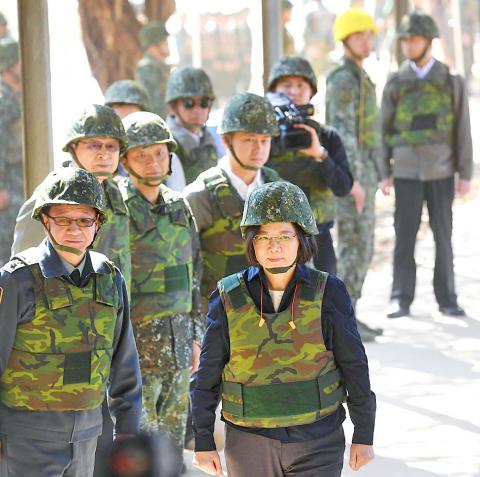President Tsai Ing-wen (蔡英文) has ordered the Ministry of National Defense to prioritize deploying air defense missile systems to counter the changing nature of the military threat against Taiwan.
Tsai yesterday spoke to military recruits after her tour of Taichung’s Chenggong Ling (成功嶺) military training camp, where she inspected live-fire sharpshooter practice and had lunch at the canteen.
Tsai said she recently toured an installation of Tien Kung III air defense weapons systems in Hualien, visited the 53rd Engineer Group in Taoyuan, and instructed the Chungshan Institute of Science and Technology to accelerate missile production.

Photo: CNA
She has a personal interest in seeing the policies through, thus fulfilling her promise to develop a self-sufficient defense industry, Tsai said.
The Tien Kung III is a hypersonic anti-ballistic missile that was developed by the institute following the 1996 Third Taiwan Strait Crisis.
Tsai said her earlier activities in Taichung that day included inspecting the Indigenous Defense Fighter jets at Taichung’s Ching Chuan Kang Air Base (清泉崗) and presenting commendations to the 58th Artillery Command for outstanding performance in a recent drill.
An advanced training jet is expected to make its first flight soon, she added.
“Your reasons for joining the armed forces, whatever they might be, are the right reasons, and your commanding officers made the same important decision before you,” she said.
Army Commander General Wang Shin-lung (王信龍) joined the service from a poor family and forged his future through military service, she added.
“As the commander-in-chief, I hope that good soldiers will become catalysts for social change, and that rigorous training will give troops combat skills, teamwork, endurance and professionalism,” she said.
Officers in charge of troops must employ effective training techniques, protect the welfare of recruits, and inspire by leadership and personal example, she said.
The Tien Kung III and the US-made MIM-104F Patriot missile are to become the backbone of the nation’s air defense arsenal, a defense official said yesterday, on condition of anonymity.
The military in 2007 began to procure Patriot missiles and the missile batteries would be fully deployed in two years if delivery of the remaining orders is not disrupted, the official said.
Total cost of the Patriot missiles is estimated to reach NT$26 billion (US$843.85 million) by next year, the official added.
Ministry officials are complying with Tsai’s instructions to speed up mass production of the Tien Kung III, the official said, adding that the completion date has been pushed up to 2022, two years ahead of schedule.
As a result, over the next four years, the defense budget would balloon faster than anticipated, they said.
Additional reporting by Lo Tien-pin

Right-wing political scientist Laura Fernandez on Sunday won Costa Rica’s presidential election by a landslide, after promising to crack down on rising violence linked to the cocaine trade. Fernandez’s nearest rival, economist Alvaro Ramos, conceded defeat as results showed the ruling party far exceeding the threshold of 40 percent needed to avoid a runoff. With 94 percent of polling stations counted, the political heir of outgoing Costa Rican President Rodrigo Chaves had captured 48.3 percent of the vote compared with Ramos’ 33.4 percent, the Supreme Electoral Tribunal said. As soon as the first results were announced, members of Fernandez’s Sovereign People’s Party

EMERGING FIELDS: The Chinese president said that the two countries would explore cooperation in green technology, the digital economy and artificial intelligence Chinese President Xi Jinping (習近平) yesterday called for an “equal and orderly multipolar world” in the face of “unilateral bullying,” in an apparent jab at the US. Xi was speaking during talks in Beijing with Uruguayan President Yamandu Orsi, the first South American leader to visit China since US special forces captured then-Venezuelan president Nicolas Maduro last month — an operation that Beijing condemned as a violation of sovereignty. Orsi follows a slew of leaders to have visited China seeking to boost ties with the world’s second-largest economy to hedge against US President Donald Trump’s increasingly unpredictable administration. “The international situation is fraught

MORE RESPONSIBILITY: Draftees would be expected to fight alongside professional soldiers, likely requiring the transformation of some training brigades into combat units The armed forces are to start incorporating new conscripts into combined arms brigades this year to enhance combat readiness, the Executive Yuan’s latest policy report said. The new policy would affect Taiwanese men entering the military for their compulsory service, which was extended to one year under reforms by then-president Tsai Ing-wen (蔡英文) in 2022. The conscripts would be trained to operate machine guns, uncrewed aerial vehicles, anti-tank guided missile launchers and Stinger air defense systems, the report said, adding that the basic training would be lengthened to eight weeks. After basic training, conscripts would be sorted into infantry battalions that would take

GROWING AMBITIONS: The scale and tempo of the operations show that the Strait has become the core theater for China to expand its security interests, the report said Chinese military aircraft incursions around Taiwan have surged nearly 15-fold over the past five years, according to a report released yesterday by the Democratic Progressive Party’s (DPP) Department of China Affairs. Sorties in the Taiwan Strait were previously irregular, totaling 380 in 2020, but have since evolved into routine operations, the report showed. “This demonstrates that the Taiwan Strait has become both the starting point and testing ground for Beijing’s expansionist ambitions,” it said. Driven by military expansionism, China is systematically pursuing actions aimed at altering the regional “status quo,” the department said, adding that Taiwan represents the most critical link in China’s